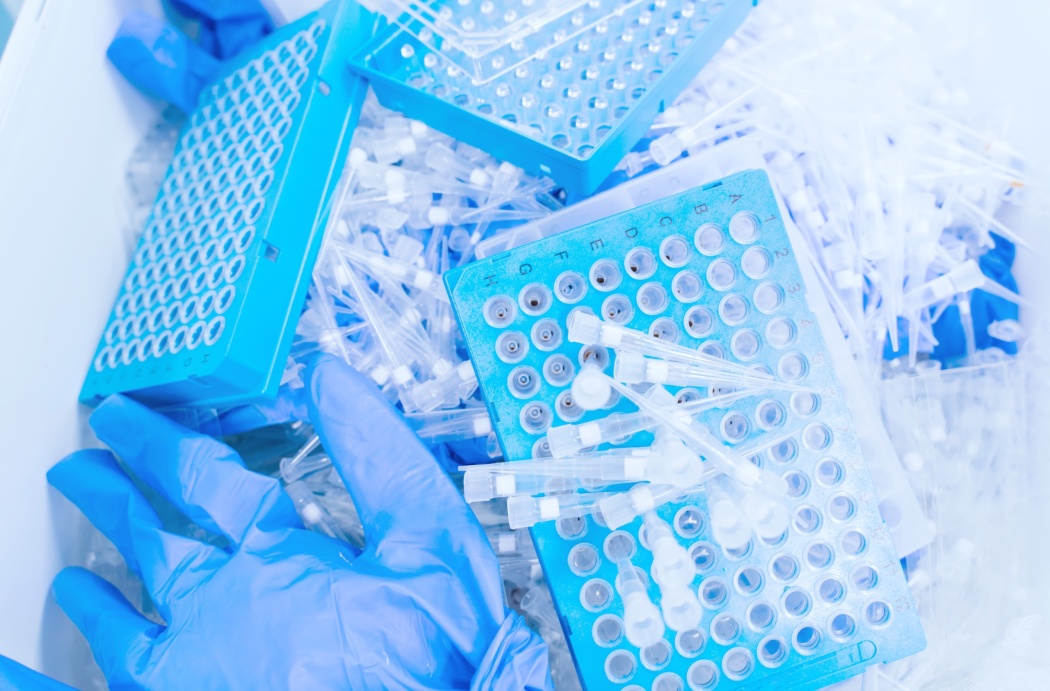
Did you know?
-
Laboratories generate up to 5.5 million metric tons (5.5 billion kg) of plastic waste each year, nearly 2% of the global total.
-
Research facilities produce up to 12 times more waste per square foot than office spaces.
-
Although much of this waste is hazardous, a significant portion isn’t and could have a different end-of-life.
-
For example,
-
Nitrile gloves can be recycled through specialized recycling programs.
-
Lab plastics – from tip boxes to conical tubes – can be recycled through proper channels.
-
Many consumables can often be safely reused if properly washed and sterilized.
-
Explore essential approaches to reducing laboratory waste while maintaining research integrity. These strategies can be implemented independently or as part of a comprehensive sustainability program, like the My Green Lab® Certification program.
Optimize experimental designs to use fewer materials. Consolidate orders to reduce packaging waste. Implement digital solutions like electronic lab notebooks to decrease paper usage and improve documentation efficiency.
Many lab items traditionally considered disposable can be safely reused. Implement proper washing and sterilization protocols, establish equipment-sharing systems, and prioritize durable alternatives to disposables.
Create comprehensive recycling stations with clear signage. Partner with specialized recyclers for lab-specific items such as pipette boxes and reagent bottles. Properly segregate waste streams to maximize recycling.
Many manufacturers offer programs to collect and recycle their products. Utilize these initiatives for items such as instrument packaging, reagent containers, and electronic equipment to reduce landfill waste.
Implement digital inventory systems to track chemicals, reagents, and supplies. Prevent unnecessary purchases, reduce expired materials, and facilitate resource-sharing between lab groups to minimize waste generation.
Choose products with specific, verified environmental credentials and measurable benefits. Prioritize suppliers who transparently document sustainability claims through third-party certifications and lifecycle assessments.
The University of Alabama Birmingham reduced 75,000 lbs of lab waste
Through My Green Lab Certification, UAB implemented smart lab practices like freezer maintenance and recycling that slashed waste and advanced sustainability at scale.
Explore our latest Beaker blog posts on waste reduction strategies, from reusable consumables to recycling systems. These practical guides provide actionable solutions for more sustainable laboratory operations.
Transform laboratory waste reduction through reusable consumables that maintain research integrity. Learn implementation strategies and best practices from labs that have dramatically reduced plastic usage.
Discover how the ACT eco-label certification empowers informed purchasing decisions to reduce laboratory environmental impacts. Learn to evaluate products based on transparent sustainability criteria.
Explore how waste reduction initiatives create significant cost savings while enhancing environmental profiles. Case studies demonstrate ROI through decreased disposal costs and improved resource efficiency.
Learn proper segregation, storage, and disposal techniques for hazardous laboratory waste. Implementing these protocols ensures regulatory compliance while minimizing environmental impact and reducing costs.
Implement specialized recycling systems for laboratory plastics including pipette tips, tubes, and packaging. This guide outlines logistics, staff training, and partnerships needed for successful programs.
Gain expert credentials in laboratory sustainability and waste management
Our Accredited Professional program provides comprehensive training on implementing effective waste reduction strategies in research environments while advancing your career in laboratory sustainability.
Transform your laboratory operations through certified sustainability practices
Join 4,500+ certified labs committed to sustainable science. Our certification provides a clear framework for measurable improvements.
